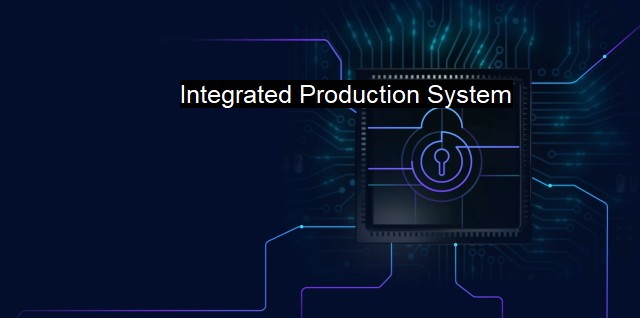What is Integrated Production System?
Integrating Cybersecurity Measures in Production: Understanding the Dynamics of an Integrated Production System (IPS)
Integrated Production System (IPS) is an emerging concept in the world of cybersecurity and antivirus. This system is essentially a comprehensive, unified system that brings together multiple layers of security in order to effectively tackle and manage the increasing threats of cybersecurity. Breaking down the term, you will find that "integrated" represents coordination; “production” symbolizes creation, while "system" indicates a set scheme of things. Hence an Integrated Production System is a systematic, creating, and coordinating platform in the cybersecurity framework.To understand IPS it becomes imperative to first understand the multifaceted nature of cybersecurity systems. Normally, cybersecurity involves dealing with a variety of factors including malware detection, email security, password management, intrusion detection, antivirus databases, and much more. This can often result in disjointed and ineffective cybersecurity solutions, due to the lack of cohesion between different software and systems. Given this context, the concept of IPS in cybersecurity seeks to unify these aspects into a single, cohesive, and effective whole.
Under an Integrated Production System, each layer of security is meticulously weaving with the other - forming a robust cybersecurity net. Interactions and operations between various security components are tracked. Antivirus software included in such an approach not only identify and destroy viruses but also coordinate with other systems to prevent future attacks.
The inclusion of the integration process makes IPS more comprehensive and productive. It connects cybersecurity components together, reinforcing each other's strengths and minimizing weaknesses by sharing data, alerts, and protection tactics across the system. In this way, not just one specific part, but the overall cybersecurity health of the organization improves.
IPS especially distinguishes itself in the way antivirus programs are managed and bulked. Traditional antivirus software independently work, scanning the system's files and removing any detected threats. some sophisticated threats may elude this henceforth unavoidable scanning. In IPS, antivirus engineers work interdependently, continuously communicating with each other and with the company’s network, creating a flexible framework that can react faster to threats.
This type of integrated system also becomes extraordinarily crucial when coping with emerging cybersecurity threats. The rapid technological advancements have begotten an extremely dynamic cybersecurity landscape where threats are often multifaceted and mutate at unprecedented speeds. Traditional security components working in isolation are often ill-equipped to manage such evolving threats effectively.
Here, IPS, with its integrated antivirus technologies, plays a significant role. The collaborative functionality of various cybersecurity aspects can quickly adapt to and manage these threats. The integrated system's holistic approach isn't just looking to rectify an occurred breach, but it actively detects and prevents potential risks.
Virtuous benefits of deploying IPS involves resources management, faster reaction times to threats, automated updates, synchronized security status, and a streamlined communication pathway. It consolidates resources, fosters efficiency, and reduces the cost in the long-term. IPS enriches the immunity against cyber threats by conglomerating singular components into one potent force.
In the worrisome digital age where data breaches, privacy invasion, and cyberattacks have somewhat become everyday issues, switching from a common disjointed cybersecurity defense to a holistic integrated production system might be the key to securing Internet-oriented businesses, individuals, and governments. Proactive cybersecurity measures such as the Integrated Production System are expected to pave the future lanes of online security.
Looking beyond traditional method-bound solutions, Integrated Production Systems is a potentially transformative idea in the world of cybersecurity and antivirus. It represents a coordinated, flexible, and dynamic strategy for harnessing various cybersecurity components' potential, resulting in an overall stronger and more adaptive defense mechanism. In an era when threat actors consistently up their game, Integrated Production System can be a game-changing companion for organizations keen on establishing comprehensive cybersecurity.

Integrated Production System FAQs
What is an integrated production system in cybersecurity?
An integrated production system in cybersecurity is a comprehensive approach to managing and protecting an organization's digital assets. It involves the integration of different security tools and technologies into a single system that can detect, prevent, and respond to cyber threats in real-time.What are the benefits of using an integrated production system in cybersecurity?
There are several benefits of using an integrated production system in cybersecurity, such as improved threat detection and response, streamlined security management, reduced operational costs, and increased visibility into the security posture of the organization. It also allows organizations to stay ahead of emerging threats and minimize the impact of cybersecurity incidents.What are some examples of tools and technologies that can be integrated into an integrated production system in cybersecurity?
Some examples of tools and technologies that can be integrated into an integrated production system in cybersecurity include antivirus software, intrusion detection systems, firewalls, security information and event management (SIEM), endpoint protection, and threat intelligence platforms.How can organizations ensure the effectiveness of their integrated production system in cybersecurity?
Organizations can ensure the effectiveness of their integrated production system in cybersecurity by regularly testing and updating their security controls, conducting vulnerability assessments and penetration testing, and providing ongoing security training and awareness to their employees. They should also have a well-defined incident response plan in place to respond to and mitigate potential security incidents in a timely manner.| | A | | | B | | | C | | | D | | | E | | | F | | | G | | | H | | | I | | | J | | | K | | | L | | | M | |
| | N | | | O | | | P | | | Q | | | R | | | S | | | T | | | U | | | V | | | W | | | X | | | Y | | | Z | |
| | 1 | | | 2 | | | 3 | | | 4 | | | 7 | | | 8 | | |||||||